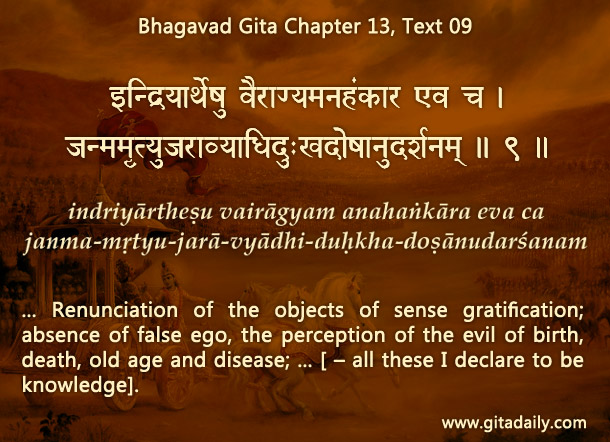How thinking about negative truths can stimulate positive thoughts – Our mind often keeps us dissatisfied by looking at those who have more than us. Though such a vision can foster ambition, more often it fosters dissatisfaction with what we have. If we can look at those who have less than us, we can be more grateful for what we have.
However, taking those below us as our reference point is not easy. Why? Because our mind presumes that those above us are the standard and resents that we aren’t where they are. To change our default view, we need to change our underlying worldview: our conception of what is standard. Prosperity isn’t the standard in the world; tragedy is. Death is life’s defining tragedy. And it is often preceded by senility and debility, tragedies in their own right. In those cases when life ends before old age arrives, such premature death too is a tragedy.
Pertinently, the Bhagavad-gita states that perception of life’s distresses characterizes knowledge (13.09). Such perception grounds us in the reality of life’s intrinsic difficulties and deficiencies. If we recognize how death can befall anyone at any moment, we will be more grateful for every day, even every moment, that we are alive. If we understand how widespread sickness is and how crippling it can be, we are less likely to gripe about our health issues.
The foregoing analysis doesn’t mean we don’t strive for better things. It just suggests that if we put a fraction of that effort in striving for better thoughts, we could be so much happier. And one underused way to get gratitude-stimulating thoughts is philosophically contemplating negative truths about life’s tragic nature.
One-sentence summary:
When we contemplate the foundational negativity of life, we can better appreciate whatever positivity is present in our life.
Think it over:
- Taking those below us as our reference point is not easy. Why?
- How is tragedy, not prosperity, the standard in the world?
- How can thinking about negative truths stimulate positive thoughts?
***
13.09: … Renunciation of the objects of sense gratification; absence of false ego, the perception of the evil of birth, death, old age and disease; … [ – all these I declare to be knowledge].
To know more about this verse, please click on the image


Nice,please keep it up.
I learned this years ago after experiencing what felt like hell, to feel gratitude for each and every absence of pain/suffering/lack and to truly understand how every need that I have met is a rarity in this world, where shelter and food and safety from atrocities and substandard living are not guaranteed.
On one hand it has helped me be grateful, put things into perspective, and approach both my own life and my service of other lives with realistic wisdom.
On the other hand, it sometimes leaves me very upset, sometimes bitter, sometimes absolutely horrified. There is an almost constant underlying terror in me, knowing how fully negative and tragic this world is, especially when coming into contact with death on a close and personal level, especially the death of something or someone young and innocent.
I pray to Krishna that my soul can be in a place that is fully positive, even if I must give up hope in this life for so much positivity that was planted in my imagination during childhood and youth.
Thank you, Steven, for sharing your experience and your realization. It requires both personal grit and divine grace to emerge stronger through such an harrowing experience as you have hinted at. Yes, praying to Krishna can bring positivity and auspiciousness in our lives.